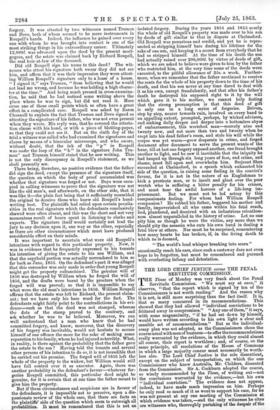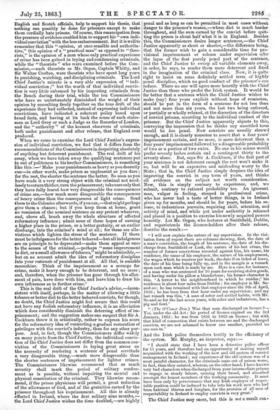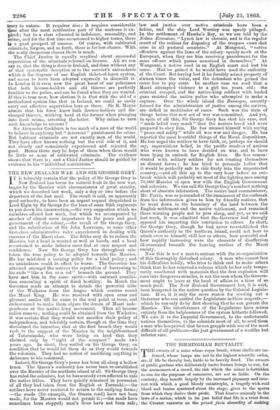THE LORD CHIEF JUSTICE versus THE PENAL SERVITUDE COMMISSION. T HE
Times of Monday was very frank about the Penal Servitude Commission. " We must say at once," it observes, "that the report which is signed by ten of the Commissioners is not worth reading." And the reason why it is not, is still more surprising than the fact itself. It is, that so many concurred in its recommendations. Thin showed that they had allowed "individual convictions to be frittered away in compromises." "Anyone of them," it says' with some magnanimity, "if he had sat down by himself, would have written according to his own light a clear and sensible set of recommendations." But as the individual- essay plan was not adopted, as the Commissioners chose the course usual with men of business—to offer the recommendations. really warranted by the evidence, in which they could almost all concur, their report is worthless • and, of course, on the same principle, all resolutions of the House of Commons in which a large majority concur must necessarily be worth- less also. The Lord Chief Justice is the sole dissentient, except on the subject of transportation, on which the one Commissioner who knew Australia, Mr. Childers, dissented from the Commission. Sir A. Cockburn adopted the course, so wisely recommended by the Times, of writing out—not the conclusions warranted by the evidence,—but his own "individual conviction." The evidence does not appear, indeed, to have made much impression on him. Perhaps he only read so much of it as went to support his case, for he was not present at any one meeting of the Commission at which evidence was taken,—and the only witnesses he cites are witnesses who, thoroughly partaking of the despair of the
English and Scotch officials, help to support his thesis, that nothing can possibly be done for prisoners except to make them cordially hate prisons. Of course, this emancipation from the pressure of evidence enabled him to support his "own indi- vidual conviction" with the less embarrassment. But it is well to remember that this "opinion, at once sensible and authorita- tive," this opinion of a "practical man" as opposed to "theo- rists," is the opinion of a man whose only practical experience of crime has been gained in trying and condemning criminals, while the " theorists " who were examined before the Com- mission,—such theorists as Mr. Organ, Captain Whitty, and Sir Walter Crofton, were theorists who have spent long years in punishing, watching, and disciplining criminals. The Lord Chief Justice's minute is a very able expression of "indi- vidual conviction ;" but the worth of that individual convic- tion is very little enhanced by his inspecting criminals from the Bench during their trial, while the ten Commissioners who have so unfortunately diminished the weight of their opinion by consulting freely together on the true drift of the experience they had collected, instead of expressing individual convictions, have indicated a coherent policy based upon broad facts, and having at its back the sense of such states- men as Lord Grey or such a Judge as the Recorder of London, and the " authority " of the keenest observers of criminals, both under punishment and after release, that England ever produced.
When we come to examine the Lord Chief Justice's expres- sion of individual conviction, we find that it differs from the recommendations of the Commissioners in despairing absolutely
of anything but deterrent punishment. The real drift of his essay, when we have taken away the qualifying sentences put in out of politeness to his brother Commissioners, is something
like this :—' Make your punishments as heavy as you decently can—in other words, make prison as unpleasant as you dare ; for the rest, the shorter the sentence the better. So soon as you have made it a very strong object with the criminal not need- lesslytoreturn thither, turn the prisonersout; takecareonlythat they have fully learnt how very disagreeable the consequences of crime are,—how much more disagreeable the consequences of heavy crime than the consequences of light crime. Send them to the Colonies afterwards, if you can, —thatmightperhaps give them a chance; but if you keep them at home, grant no remission of the nominal sentence on any pretext whatever, and, above all, brush away the whole structure of affected reformatory influence; admit none of these hopes of earning a higher place in the prison, or a better gratuity, or an earlier discharge, into the criminal's mind at all ; for these are alle- viations which lighten the stress of the sentence. If there must be indulgences for the better behaved—but 911 indulgences are on principle to be deprecated—make them appeal at once to the senses of the criminal,—perhaps "some improvement in diet, or a small allowance of tobacco," might be admissible,— but on no account admit the idea of reformatory discipline
into your rationale of punishment at all. All that, is amiable
moonshine. Think of the imprisonment as a scourge for crime, make it heavy enough to be deterrent, and no more ; and, therefore, when the prisoner has gone through his allot- ment of pain, have done with him, and leave him to draw his own inferences as to further crime.'
This is the real drift of the Chief Justice's advice,—incon- sistent with itself, perhaps, in the matter of allowing a little tobacco or better diet to the better behaved convicts, for though, no doubt, the Chief Justice might feel secure that this could not have any foolish reformatory influence, it is an alleviation which does considerably diminish the deterring effect of im- prisonment; and the suggestion makes one suspect that Sir A. Cockburn threw it in artistically, rather to express his scorn for the reformatory idea of connecting a gradual restoration of privileges with the convict's industry, than for any other pur- pose. And, in fact, though the Commissioners differ widely on many points from the Chief Justice, the individual convic- tion of the Chief Justice does not differ from the common con- viction of the Commissioners in laying great stress on the necessity of rendering a sentence of penal servitude a very disagreeable thing,—much more disagreeable than the shorter sentences of imprisonment for lighter crimes. The Commissioners likewise recommend that as much severity shall mark the period of solitary confine- ment as is possible, without impairing the mental and physical constitution of the criminal. They likewise recom- mend, if the prison physicians will permit, a great reduction of the allowances of food, and of the gratuities earned by the prisoner throughout his imprisonment. All this is already effected in Ireland, where the first solitary nine months,— the Lord Chief Justice wishes the time doubled,—are highly
• penal and as long as can be permitted in most cases without danger to the prisoner's reason —where diet is much harder throughout, and the sum earned by the convict before quit- ting the prison is about half what it is in England. Besides this, the Commissioners desire longer sentences,—the Chief Justice apparently as short or shorter,—the difference being, that the former wish to gain a considerable time for pro- visional imprisonment or release under supervision after the lapse of the first purely penal part of the sentence, and the Chief Justice to sweep all variable elements away, in order, he says, to render thorn more deterrent and fixed in the imagination of the criminal class. Now, it is quite right to insist on some definitely settled term of highly penal discipline, which no good conduct of the prisoner's can reduce. There no one will agree more heartily with the Chief Justice than those who prefer the Irish system. It would be far better that a sentence which the Chief Justice wishes to make (say) four years explicit without hope of remission, should be put in the form of a sentence for not less than and not more than six years, the last two being enforced; or partially or wholly relaxed, at the discretion of the directors of convict prisons according to the individual conduct of the prisoner. But the Chief Justice apparently objects to this, conveying the impression that he thinks any unsettled term would be less penal. Now convicts arc usually shrewd enough, and it is clearly nonsense to assert that a four years' imprisonment certain, and no more, is more deterrent than a four years' imprisonment followed by a disagreeable probability of two or a portion of two extra. No one in his senses would prefer seventy lashes certain and a contingent thirty to tho seventy alone. But, says Sir A. Cockburn, if the first part of your sentence is not deterrent enough the rest won't make it so, but will be an expensive and misleading worry to the State ; that is, the Chief Justice simply despises the idea of improving the convict in any term of years, and thinks all evidence on the subject not worth consideration. Now, this is simply contrary to experience, and, we submit, contrary to rational probability too. An ignorant man, vulgar in feeling, steeped in professional crime, who has never had a taste of better things, is in Ireland given up for months, and should be for years, before his re- lease, to industrious pursuits, requiring skill, attention, and activity of mind, and while yet under authority is released and placed in a position to exercise his newly acquired powers honestly. Let Mr. Organ, who lectures at Smithfield, Dublin, and superintends the licence-holders after their release, describe the result :— " I will now explain the nature of my supervision. In the visi- tation form of report there are columns showing, first, the date of a man's conviction, the length of his sentence, the date of his dis- charge from Smithfield or Lusk, the nature of his last crime, the number of former convictions recorded against him, his name, his residence, the name of his employer, the nature of his employment, the wages which he receives per week, the date if on ticket of leave, the date of his time being fully up, and in the margin is a remark upon each man which is made by me. Here is a case, for instance, of a man who was sentenced for 10 years for receiving stolen goods, and having under his pillow a blunderbuss ; his former character is this, 'A terror to the neighbourhood in which he resides ;' his residence is about four miles from Dublin ; his employer is Mr. So- and-so ; he has remained with that employer since the 9th of April, 1856; he has been from that hour under my supervision ; and my last remark was this, A man of sober and settled habits, with Mr. So-and-so for the last seven years, wife sober and industrious, has a pig and fowl.'
"(The O'Conor Don.) Was that man discharged on licence ?— Yes, under the old Act ; his period of licence expired on the 3rd January, 1862; he was from 1856 to 1862 on licence ; but with that kind of connection that exists between me and the discharged convicts, we are not ashamed to know one another, provided no one sees us."
And the Irish police themselves testify to the efficiency of the system. Mr. Murphy, an inspector, says:— "1 should state that I have been a detective police officer for 11 years, and therefore had an opportunity of making myself acquainted with the working of the new and old system of convict management in Ireland ; my experience of the old system was of a most painful character, for the criminals came out of prison worse, in fact, than they entered, whereas, on the other hand, I have known very bad characters when discharged from your intermediate prisons to engage in steady labour, earning their bread, and absorbed amongst the honest member: of the working community. It must have been only by perseverance that any Irish employer of respec- table position could be induced to take into his work men who had been habitual thieves and burglars, for the aversion of all men of respectability in Ireland to employ convicts is very great."
The Chief Justice may sneer, but this is not a result con-
trary to nature. It requires time ; it requires considerable titne after the most retributive part of the sentence is ex- pired; but to a class educated in indolence, sensuality, and crime, and for the first time accustomed to higher tastes, there is a good prospect of success. Of course, with cultivated criminals, forgers, and so forth, there is far less chance. With the really dangerous classes there is much. The Chief Justice is equally sceptical about successful supervision of the criminals released on licence. All we can say is, that the thing is done in Ireland, and done without any of that systematic deception as to the convict's antecedents which is the disgrace of our English ticket-of-leave system, and seems to have been adopted expressly to discredit it. In London it is even now the great boast of our policemen that both licence-holders and old thieves are perfectly familiar to the police, and can be fmnd when they are wanted. If this is true now, how obvious it is that with the aid of a methodizal system like that in Ireland, we could as easily carry out effective supervision here as there. Sir It. Mayne admits that his force know both licence-holders and dis- charged thieves, winking hard at the former when plunging into fresh crime, arresting the latter. Why refuse to turn such knowledge to account ?
Sir Alexander Cockburn is too much of a man of the world to believe in anything but " deterrent " punishment for crime. But habitual criminals are not exactly men of the world. They have often known nothing but the evil side of it, and not clearly and consciously experienced and rejected the good. Hence there may be hope of them when there would be little or none of cultivated criminals. The evidence shows that there is ; and a Chief Justice should be guided by evidence in his "individual convictions."
































 Previous page
Previous page